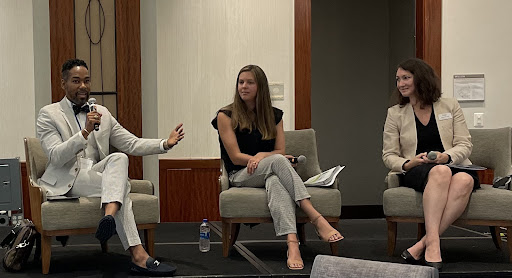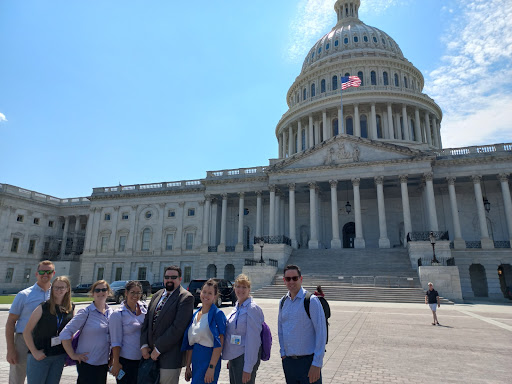During the Special Education Legislative Summit in Washington DC, national education leaders convened with delegates from forty five states to discuss special education’s most critical issues and prepare these delegates to address these issues with their Congressional representatives. One of the key briefs addressed was federal IDEA Appropriations for Special Education.
Funding is almost always the biggest issue in special education. Every year, the federal government fails to meet its funding commitment as set forth by IDEA. Both the CEC and CASE are committed to ensuring that our congressional leaders are not only aware, but do something to move towards the full-funding set forth by the law. Some of the featured speakers included Stride Policy Solutions’ Kuna Tavalin, the National Association of Independent Colleges and Universities (NAICU) Director Emmanuel Gillory, and Policy Research Associate at the National Center for Learning Disabilities (NCLD) Nicole Fuller.

Pictured: Emmanuel Gillory, Nicole Fuller and Kuna Tavalin
4 FUNDING FACTS
- The number of students receiving services under IDEA has risen by 17% since 2000.
- Approximately 6% of public school students are enrolled in gifted & talented programs.
- 98% of school districts are currently reporting special educator shortages.
- Only half of the youth with mental health conditions received treatment last year.
IDEA APPROPRIATION ISSUE BRIEF OVERVIEW
A strong federal investment in programs that provide targeted support is critical to ensuring student success. Unfortunately, these programs are consistently and heavily underfunded, putting an immense strain on special education, as well as the entire system.
The Individuals with Disabilities Education Act (IDEA) is the preeminent federal law for providing services to students with disabilities. Fully funding IDEA would significantly improve outcomes by ensuring access to much-needed intervention services, special educators trained to provide specifically designed instruction, curricula, devices, family support, and specialized instructional support services.
Strengthening and investing in public education is the means to ensure all children and youth, regardless of background or disability, can access a high-quality education.
Consistently well-funded programs will lead to better outcomes to all children and students with disabilities. The SELS advocates call on Congress to provide appropriate funding levels in Fiscal Year (FY) 2023 for all of public education, and specifically the programs listed below.
ISSUE BRIEF MAIN POINTS
- Supporting Special Education in Schools. Approximately 7.4 million school-aged children and youth in the US benefit from the individualized special education and related services provided under IDEA. IDEA includes a commitment from the federal government to cover 40% of the “excess costs” of serving students with disabilities. Unfortunately, the federal share was only about 13% in Fiscal Year FY 2o22, leaving states and school districts to pay the balance. It is imperative that Congress put IDEA on the first step of a 10-year glidepath to full funding in FY 2023.
- Supporting the Needs of Young Children with Disabilities and their Families. Over the last 30 years, the number of children served by early childhood support programs has grown by 50%. Despite this increase and the documented positive outcomes, the federal investment per child has decreased by 40% over this same period. This has placed a significant and growing strain on these programs.
- Ensuring a High-Quality Special Educator Pipeline. IDEA Part D, Section 662 focuses on preparing special educators to help ensure an adequate number of providers with the skills and knowledge to support students with disabilities. This program is increasingly critical to addressing pervasive personnel shortages across the nation.
- Supporting School Mental Health Services. There is a significant mental health crisis in this country. 1 out of every 6 students experience some form of mental health disorder every year. As the problem continues to grow, more funding is needed to help support school-based mental health services and provide more personnel.
- Delivering the Research that Guides Best Practices. The Nation Center on Special Education Research (NCSER) is the primary driver of special education research and identifies evidence-based practices for educators. NCSER has been operating on a diminished budget for over a decade. Restoring funding is critical to continuing research and researching critical topics in special education.
- Meeting the Needs of Learners with Gifts & Talents. This program is an equity accelerator that ensures students with gifts and talents, regardless of their background, can excel and thrive.
THE 2022 SELS DELEGATES ASKED CONGRESS TO
- Invest no less than $16.2 billion in IDEA Part B State Grants (Sec. 611).
- Invest $932 million in IDEA Part C.
- Invest $503 million in IDEA Part B Section 619.
- Invest $300 million in IDEA Part D personnel preparation (Sec. 662).
- Invest $1 billion in SChool-Based Health Professionals.
- Invest $70 million for the National Center for Special Education Research.
- Invest $32 million in the Jacob K. Javits Gifted & Talented Grants.

Pictured: Utah SELS Delegation along with eLuma Team Members
CONCLUSION
Here at eLuma, we are doing all that we can to advocate to ensure that the Federal Government upholds its full funding IDEA commitment. We are proud that we could participate in the grassroots advocacy and will continue to look for ways to make sure that every student has the access to the support they need. We invite you to do the same!

